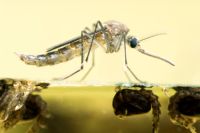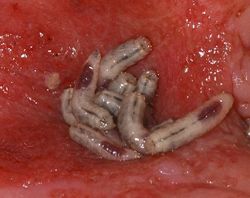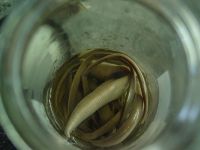Since the dawn of time, bloodsuckers, common pests and creatures with more than 4 legs have bit, poisoned, annoyed and scared the daylights out of the human population. Which is why most people often wish these little nuisances never existed.
Health24 set out to find out which bugs we could wish extinction on – which bugs, we wondered, have no useful role to play?
Uh oh. It seems every one of them has a part to play in the Big Ecological Picture.
Mosquitoes
These tiny vampires buzz around sucking blood and spreading malaria. They’re high on our hate list.
Why should we be nice to them? If every mosquito were suddenly vaporised from the face of the earth, the entire ecosystem would be out of balance.
Mosquitoes are a staple food supply for bats, many birds and amphibians. The larvae of the mosquito are a food source for many fish. If the mosquito was removed, these creatures would lose their primary food source and might face starvation and eventual extinction.
If these bats, birds, fish and amphibians, in turn, die of starvation, then the animals that prey on them in turn would also have no food supply. With time, it would dramatically affect the human population.
Mosquitoes are also pollinators, as a part of their diet is composed of plant nectar. So that’s both the plant and animal kingdoms they’re serving, then.
Maggots
These freaky and creepy larvae have been over-used in horror films to gross viewers out. They remind us of death and decomposition, and we are instantly turned off at the sight of them. Ugh.
Why should we be nice to them? These small larvae are well respected in the medical field. They are so useful that a form of therapy has been named after them: maggot debridement therapy (MDT).
MDT is a process where maggots are applied to a wound for two to three days. They’re contained by a special dressing which is also applied to the wound to prevent the maggots from …er… migrating. They secrete a substance that kills bacteria, completely disinfecting wounds; and they dissolve and eat the dead and infected tissue. They don’t like healthy living tissue. They do the same with rotting animal carcases, which in turn speeds up the decomposition process.
However not any maggots are good enough: blowfly maggots are the winners, and are what is prescribed by hospitals in the US and Europe.
When maggots grow up, they turn into….
Flies
They get in your face at every opportunity, especially when you’re eating.
Why should we be nice to them? Almost exactly like when they were in their former larva state, flies are brilliant decomposers. They clean out the carcases of animals, hastening the decomposition process and laying eggs which hatch an army of maggots.
They are also a primary food source for many creatures ranging from fish, amphibians, birds, spiders, reptiles and other insects. So if they died out, so would these creatures, and you know the rest.
Cockroaches
Cockroaches trigger more revulsion in humans than most other bugs. They’re said to have the survival skills that ensure that even the world implodes, they will still be with us; and anyone who has declared war on a cockroach can testify that they are as resilient as Terminator.
Why should we be nice to them? The cockroach is Nature's hobo, constantly moving and never has a home of its own. They are also nature’s greatest recyclers, omnivorous scavengers who clean up after every other creature on earth.
They are also a food source for many animals, hence the Lion King’s “Circle of Life” is brought back into the picture.
According to a list provided by The World Health Organisation, only 10 of the more than 3 000 documented species of cockroaches are considered real pests.
Leeches
These annelids are literally a pain for people who live near swamplands. They drop from vegetation onto heads or brush off against arms and legs, and burrow their little suckers into your skin, and turn into fat little kidneys hanging off you.
Why should we be nice to them? Pestilent they may be, but they have been used medically throughout history, specifically to let blood. Even the ancient Egyptians were sussed to them.
In the mid-19th century bloodletting became a highly fashionable cure-all and leeches became so popular in commercial trading that they almost became extinct in nature. Apart from a 20-year period between the 60s and the 80s, they have never again lost favour.
The leeches help tremendously with some microsurgeries, mainly in plastic and reconstructive surgeries where a condition known as venous insufficiency is a really big problem. Venous congestion arises when there is no venous drainage and this is where the leech becomes useful: they suck up the excess blood and prevent blood clots in the arteries.
The saliva of the leech is pretty fascinating. A lot of the compounds in the saliva are useful in the medical industry. Some of the compounds include an anaesthetic, an anti-coagulant and prostaglandin, which helps reduce swelling.
So, on balance…
They might be creepy. They might be disgusting. They might suck your blood and scuttle under your fridge and keep you awake with their whining and buzzing. But they’re all part of the Circle of Life, so we’re just going to have to put the Doom down, and learn to live with them.
Because we can’t live without them.
(Kyle Boshoff, Health 24, October 2012)
Read more:
Sources:
(National Geographic online; Science in Africa; Helium, zoology; The cockroach home page; Survive outdoors; Leeches.biz; Medicaledu.com; suite101)




 Publications
Publications
 Partners
Partners


















